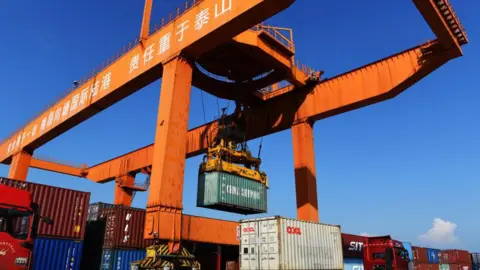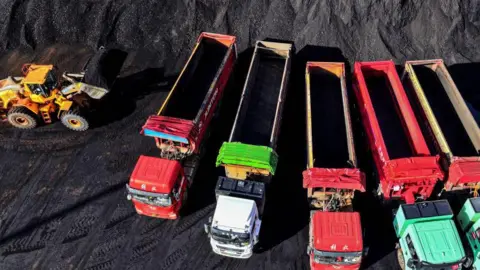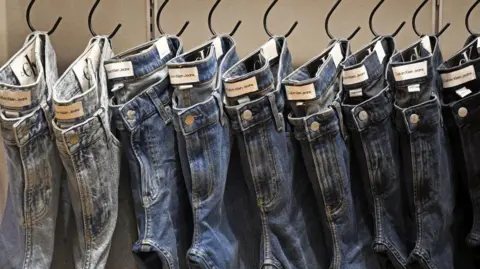Physical Address
304 North Cardinal St.
Dorchester Center, MA 02124
Physical Address
304 North Cardinal St.
Dorchester Center, MA 02124

Business reporter, BBC News
 Getty Images
Getty ImagesThe trade war between the two largest economies in the world escalated after China returned against the introduction of customs tariffs with the United States’ own measures.
Beijing sought to target specific US products with retaliatory taxes, following a 10% tariff introduced by President Donald Trump, about all Chinese imports to the United States.
In a sense, this most recent Tit-Forr is based on any new and long-term commercial debate between nations, and the tariffs have been forced and threatened by various goods since 2018.
Trump said he was planning to talk to Chinese President Xi Jinping, so another agreement can be concluded. But if China is scheduled to continue its response on February 10, what could the effect?
 Getty Images
Getty ImagesPart of the fight against Trump’s Tarifas is to announce its own taxes on US coal and liquefied natural gas (LNG) pays a 10% and 15% fee for crude oil.
The Beijing response means that they want to import fossil fuels from the United States.
China is the world’s largest carbon importer, but most of it receives from Indonesia, although Russia, Australia and Mongolia are also suppliers.
For the United States, China increases the import of LNG from the country, according to Chinese customs data, nearly twice the volumes in the 2018 level.
But the general fossil fuel trade is modest, with the import of the US to only 1.7% of China’s total crude oil, which was purchased from abroad in 2023. Or
Rebecca Harding, a commercial economist and the CEO of the Economic Safety Thinking Center, said China could easily get more stocks from Russia, where the Kremlin is trying to finance war efforts.
On Flipside, the United States is the world’s largest LNG exporter, including many other customers, especially the United Kingdom and the European Union.
In addition to the fuel, China struck a 10% tariff on agricultural machines, vans and some big cars.
But China is not a big importer from American footage and receives most of its cars from Europe and Japan, so the 10% tariff of a small number of imports does not hit consumers too hard.
In recent years, China has increased investments in agricultural machinery to increase production and rely on imports and strengthen food safety.
So the introduction of the tariffs of agricultural machinery could be another step to boost the domestic industry.
Julian Evans-Pritchard, leader of China Economics at Consultancy Capital Economics, said that all tariff measures are “quite modest, at least compared to American movements”.
He proposes that China’s targeted products are about $ 20 billion (£ 16 billion) of annual imports – about the full import of China. 12%.
“This is far from the Chinese goods of more than $ 450 billion that the United States targets.”
But he said that China was “clearly calibrated to try to send a message to the United States (and the domestic audience) without causing too much damage.”
The Chinese authorities have also announced some non-tariff measures, one of which is an anti-monopoly investigation into the US technology giant Google.
It is not clear what the study will mean, but in terms of context, Google search services have been blocked in China since 2010.
The company still has some business presence in the country by providing applications and games in the Chinese markets through cooperation with local developers.
But China is only approx. It generates 1%, which suggests that if it completely interrupts relationships with the country, it would not be much worse.
 Getty Images
Getty ImagesChina has added the PVH, the US company, which owns Calvin Klein and Tommy Hilfiger designer brands to the so-called “unreliable organization” list of “discriminatory measures against Chinese businesses”.
The list of other US companies in 2020 was made by Beijing in the midst of warming up tensions.
For Calvin Klein and Tommy Hilfiger, participating in the Chinese list makes business business more difficult in the country. They can face sanctions, including fines and withdraw the work of their foreign employees.
Andreas Schotter, International Business Professor at Western University at Ontario, Canada, says regulators also go to companies to investigate operations.
The United States has their own “organization list” that prevents some organizations from buying products from US companies without approving Washington.
“China is in the same collision as President Trump accuses Chinese companies. This is part of the United States and China’s relations in the United States,” added Professor Schotter.
While tariffs have been placed on companies wishing to import goods from abroad, China also requires export checks for 25 rare metals.
Some of the metals are a key element of many electrical products and military equipment.
China has mastered the ability to refine such metals and produced almost 90% of global sophisticated production.
The limited list includes tungsten, which is difficult to obtain and is key to the aerospace industry.
Although there are restrictions on exports, Evans-Pritchard, Mr. Capital Economics, said it is noteworthy that China’s critical metals from the United States are brought to high-end chips, semiconductor machines, medicines and aircraft. any action.
Experience in previous rounds of restrictions suggests that exports suddenly decrease when companies receive licenses, this process lasts several weeks.
The impact of restrictions seems to have a plan for the United States. On Monday, Trump said he wanted Ukraine to guarantee rare earth’s extra metals in exchange for $ 300 billion in support in the fight against Russia.